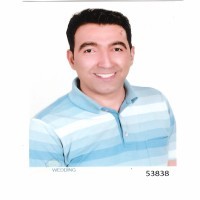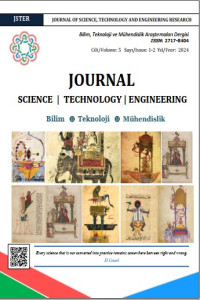Review Article
Research Article
Issue Editorial Board

Mehmet BULUT received his Ph.D. in Electrical Engineering from Yildiz Technical University, Istanbul, in 2001. He started his career in 1993 as a Research Assistant at Dumlupınar University, Department of Electrical and Electronics Engineering.
In 1998 and started working as an Automation Engineer (I&C) at Eti Gümüş A.Ş. General Directorate. He took part in the SCADA+PLC conversion studies of the company's control system. He transferred to Electricity Generation Inc. in 2003., He served as Manager of Gölbaşı Technical Control and Laboratories affiliated to the Thermal Power Plants Department in 2007 and as R&D Director between 2008-2013. He served as the coordinator of the “Establishment of Maintenance Management System (BYS) in Thermal Power Plants” project carried out within the R&D Directorate. In 2013, he was appointed as the Head of the newly established Nuclear Power Plants Department During his duty as the Head, he attended the “Leadership and Management for Nuclear Power Programmes” training course organized by the International Atomic Energy Agency (IAEA) within the Argonne National Laboratory (ANL) in the USA in 2013. He was appointed as the Advisor to the General Directorate of EÜAŞ in 2015.
He received the Industrial Energy Manager certificate at the end of the course he attended at the EIE (Electrical Affairs Surveying Administration) in 2010. He received EU Basic Training and EU Specialization Training from Ankara University, European Communities Research and Application Center (ATAUM) in 2005 and 2006.
He served as a Member of the Advisory Board (DK) within the TUBITAK-TEYDEB Electrical-Electronic Technologies Group (ELOTEG) between 2019-2022.
He is part-time lecturer at the Electrical-Electronics Engineering and Aircraft Electrical-Electronics Departments of Atılım University.
He is the founding editor of the academic journal “Journal of Science, Technology and Engineering Research (JSTER)” published twice a year on the Dergipark platform.
Issue Reviewers


I have over 10 years of experience in artificial intelligence, natural language processing, web application development, digital marketing, and IT. I am also one of the founders of the Smartlab technology center at Toros University, where research and development activities are conducted. Furthermore, I hold IBM certifications in Python programming and Data Science, and I serve as a mentor within the Kaggle community a hub for data science and machine learning.
My mission revolves around acquiring and disseminating novel technologies in software while gaining insight into how young individuals shape their technological career paths. Infusing my professional endeavors with creativity, I take pleasure in team-building, mentoring, and supporting startups. With substantial exposure to both the software industry and academia, I impart this knowledge to my students and mentees. Additionally, I boast a successful track record in patent, utility model, and industrial design registration applications.














İshak Parlar, I graduated from Gazi University (Ankara, Turkey) Electrical and Electronics Engineering Department in 2012. After working in the telecommunication field for many years, I entered academia. I completed master degree and doctorate (PhD) education at Yüzüncü Yıl University. I am also a Research Assistant in the Department of Electrical and Electronics. I continue to work in areas such as analog electronics, digital electronics, memristor simulation, emulator design, oscillator design, op-amp design, matlab/Simulink applications, pSPICE, orCAD, Multisim circuit applications, filter applications, algorithm and optimization, video and audio encryption, PID, Sliding Mode Control and ECG, EEG and EMG signal processing applications, Arduino and FPGA applications.
Aim & Scope
It is a PEER REVIEWED, OPEN ACCESS international journal that publishes articles related to science, technology and engineering and is published twice a year.
Journal of Science, Technology and Engineering Research (JSTER);
It is a PEER REVIEWED, OPEN ACCESS international journal that publishes articles related to science, technology and engineering. The Journal of Scientific, Technology and Engineering Research is a refereed, open access international academic journal that publishes articles on science, technology and engineering, and is published twice a year.
The Journal of Science, Technology and Engineering Research is a peer-reviewed, six-month, online international research journal that publishes original articles, research articles, articles and applications from all scientific fields of engineering and technology research. Journal of Science, Technology and Engineering Research is an international open access peer-reviewed online journal and offers original research articles and effective communication covering all areas of science, engineering and technology. The primary mission of the journal is to be the leading source of high-quality research from all over the world.
JSTER is a halve annually scientific journal edited by Editorial Board. It contains the theoretical and experimental studies concerning and perspective researches in the conception and scientific fields of technological projects and engineering applications.
The editorial activity is coordinated by the Editorial Board and the Scientific Reviewers, who are impressive scientific staff from the departments in Turkey and other World Universities.
JSTER publishes the most recent theoretical and experimental studies concerning scientific fields of the technological projects and engineering applications focusing but not limiting on:
- Electrical and Electronic Engineering
- Automation, Computers and Information Technology
- Energy, Sources and Energy Researches
- Renewable Energy Systems
- Mechanical Engineering and Mechatronic
- Neuroscience and Biomedical Engineering
- Industrial Engineering
- Engineering and Management
- Applied Engineering Sciences
- Materials Science and Engineering
- Chemical Engineering.
- Environmental Protection Technologies
- Aeronautical Engineering
- Oil and Gas Engineering
DETAILED ENGINEERING SUBJECTS
- Engineering and Technology
- Aerospace Technologies
- Agricultural Technologies
- Artificial Intelligence
- Audio Systems
- Automotive Engineering
- Biological & Bio system
- Chemical Engineering
- Civil Engineering
Design of Algorithms - Electrical Engineering
- Electromechanical System
- Electronics & Communication
- Environment Engineering
- Food Protection Technologies
- Geological Engineering
- Image Processing
- Industrial Engineering
- Bioengineering
- Material Engineering
- Mathematic and Algorithms
- Mechanical Engineering
- Mineral & Metallurgical
- System Model Design
- Nuclear Engineering
- Statistical Techniques
- Petroleum Engineering
- Physics Engineering
- Production & Manufacturing
- Software Development
- Telecommunication Engineering
Author Guidelines
Publication Period
The Journal of Science, Technology and Engineering Research, a refereed international journal scanned in international indexes, is published twice a year (eISSN: 2717-8504), in June and December.
Publishing Language
The bilingual language of the Journal of Science, Technology and Engineering Research follows a bilingual publication policy in Turkish and English. Articles published in Turkish or English full text also include English title, abstract, key words and extensive summary.
Turkish or English abstracts should be written in Times New Roman font and in Italic form, 10 points, 11 fonts should be chosen for the main text. Single line spacing should be chosen in the writing of the abstract.
It should be noted that the abstract of the article should be at least 150 and at most 300 words.
It is recommended that Turkish and English abstracts should not exceed 1 page. The number of keywords should be at least 3 and at most 6.
Articles accepted for publication by the Editorial Board are read by language (Turkish, English) editors. The author (s) may be offered corrections to the writing of the article by the editorial board, referees or language editors during the evaluation of the articles. It is the authors' responsibility to make these corrections.
Each author submitting a manuscript must have and ORCID number. Visit https://orcid.org/signin to register for free.
NOTE : To download article templates, it is necessary to be a member of Dergipark platform. https://dergipark.org.tr/en/login
1- Abstract Page
It should be noted that the abstract of the article should be at least 150 and at most 300 words.
The template for the English Abstract is located on the first page of the template article provided in the links below.
2- Article Writing Template
Single column, 11 point, Times New Roman format is used for articles to be published in our journal.
The article template in Word format / PDF format
NOTE : If you are having trouble downloading templates through the Dergipark system, please contact jster.editor@gmail.com.
We expect you to use articles related to your subject published in our JSTER journal and use them as references in your article.
IMPORTANT ! : ARTICLES MUST BE UPLOADED WITHOUT AUTHOR NAMES AND INFORMATION, DURING THE SUBMISSION PHASE.
3- Reference Layout
- APA or IEEE formats should be selected as the reference format.
APA Example:
Pany, C. (2021). Structural Analysis of Metallic Pressure Vessels With Weld Sinkage in the Circumferential Joint. Journal of Scientific, Technology and Engineering Research, 2 (1), 4-10. DOI: 10.5281 / zenodo.4586360
IEEE Example:
C. Pany, "Structural Analysis of Metallic Pressure Vessels With Weld Sinkage in the Circumferential Joint", Journal of Scientific, Technology and Engineering Research, c. 2, the number. 1, ss. 4-10, Jun. 2021, doi: 10.5281 / zenodo.4586360
4- Click to download the Author Copyright Form.
https://dergipark.org.tr/tr/download/journal-file/22112
All authors must sign the copyright form, scan it and upload it to the system at the article submission stage.
5- Plagiarism Control / Similarity Ratio File:
The full text of your article, including the references section, must be scanned with "iThenticate" or "Turnitin" programs, and the result of the similarity ratio to be obtained from the relevant program must be uploaded to the system in PDF format.
The article file to be sent to JSTER by the authors should be screened for plagiarism (similarity) through similarity scanning programs.
Plagiarism screening should be performed by excluding “citations, parts of text with less than 5 words of overlap, and references part”. In the detailed report obtained as a result of the similarity scan, the similarity rate should be at most 20% or less. In addition, the similarity rate from single work should never exceed 5%.
Articles above this rate, after providing similarity under %20 then will be considered.
Articles accepted as a result of peer-review whichever one of the mentioned similarity programs is used, it should be noted that the similarity rate should not be over 20%.
When uploading the plagiarism similarity report file to the system, the phrase "Similarity Report" should be written in the file name section. You can upload the plagiarism (similarity) report file to the system as an additional file.
Before the article is submitted, you can check the originality using the "plagiarism control" software listed below:
- https://www.turnitin.com
- Küçük SEO Araçları
Motor Arama Raporları
Dupli Denetleyicisi
Plagiarisma
Plag Tarama
Citation Makinası
BibMe
Ethical Principles and Publication Policy
JSTER PUBLICATION POLICY
Journal of Science, Technology and Engineering Research (JSTER); It is an open access, online, peer-reviewed academic journal .
JSTER ETHICAL PRINCIPLES
JSTER Journal; Being aware of the fact that information should be easily accessible in order to advance scientific studies, the refereed journal literature in the Budapest Open Access Declaration supports the initiative of open access and presents all published articles free of charge in an environment that everyone can read and download. These open access policies adopted by our editorial board, adopted on September 12, 2012, can be accessed at http://www.budapestopenaccessinitiative.org/boai-10-translations/turkish-translation.
Refereed articles are studies that ensure the application of the scientific method and impartiality. Publishing an article in a refereed journal is an important building block in developing a consistent and respected information network. It is a direct reflection of the quality of work of the author and the institutions that support them. Refereed articles support and embody the scientific method.
All parts of the publishing process in the realization of scientific production; publishers, editors, authors, reviewers and readers must comply with ethical principles. In this context, the publication ethics of Ankara University Faculty of Education Journal and the open access policy are also in line with the guidelines and policies published by the Committee on Publication Ethics (COPE) in open access (For example, the Code of Ethics (COPE) Code of Conduct and The Best Practice Guidelines for Journal Editors; “Code of Conduct and Best Practice Guidelines for Journal Editors” and “COPE Best Practice Guidelines for Journal Editors” require that all components of the publishing process comply with ethical principles.
Therefore, it is expected from all stakeholders to provide expected ethical standards of ethics. Ethical issues to be considered in publishing:
Article Authors' Ethical Responsibilities:
• The author of the article: Authorship should be limited to those who make significant contributions to the design, design, execution, or interpretation of the reported work. Transparency about the contributions of the authors is documented by the Copyright and Author Agreement..
• Originality and plagiarism: Authors should ensure that they write entirely original works, and when the authors use others' works and / or words, this is properly quoted or quoted.
• Data access and retention: Authors may be asked to provide raw data associated with an article for editorial review and must be ready to provide access to such data.
• Multiple, unnecessary or simultaneous broadcasts: An author should generally not publish articles describing the same research in more than one journal or primary publication.
• Sources approval: Appropriate approval of the work of others should always be given.
• Disclosure and conflicts of interest: All applications should include disclosure of all relationships that could be viewed as a potential conflict of interest.
• Basic mistakes in published works: When an author finds a significant error or mistake in his own work, he is obliged to notify the journal editor or publisher immediately and contact the editor to withdraw or correct the article.
• Human or animal rights: To ensure compliance with national and international laws and guidelines for all studies involving human or animal subjects (for example, WMA Helsinki Declaration, NIH Laboratory Animal Policy, EU Directive on Animal Use), to confirm that the necessary approvals have been obtained. respect. To specify the relevant ethics committee approvals and research details regarding his work in the “Materials and Methods” section of the study.
Ethical Responsibilities of Referees
• To contribute to the editor's decision making process, review the article objectively in time and agree to evaluate only the studies related to his area of expertise.
• To make the assessment objectively only in relation to the content of the study. To evaluate the work without considering religious, political and economic interests.
• Providing guidance to help improve the quality of the article to be published and scrutinizing the study. Communicating your comments to the author in a constructive and kind language.
• To protect the confidentiality of the information provided by the editor and the author, to destroy the study he / she examined in accordance with the principle of confidentiality after the evaluation process, to inform the editor if there is a situation against the blind peer review and not to evaluate the study.
• Be aware of potential conflicts of interest (financial, institutional, collaborative, or other relationship between the author and the author), and warn the editor to retract their help for this article if necessary.
Editors' Ethical Duties and Responsibilities
• Acting in a balanced, objective and fair manner while performing their duties without discriminating on gender, religious or political beliefs, ethnic or geographical origins of the authors.
• To evaluate the works sent to the journal according to its content, not to privilege any author.
• To take necessary measures to prevent possible conflicts of interest and to evaluate existing statements, if any.
• To handle sponsored works or works on special topics in the same way as other works,
• In the event of an ethical complaint, to follow the journal's policies and procedures and to apply the necessary procedures. To give the authors an opportunity to respond to the complaint, not to refuse to apply the necessary sanctions regardless of who the study belongs to.
• If the journal does not comply with its purpose and scope, to refuse the work.
Price Policy
All articles in the "Journal of Science, Technology and Engineering Research -JSTER" (e-ISSN: 2717-8404) are published with an open access model.
Submission Fee : ---
Editorial Processing Charges (EPCs): ---
Indexes
Journal Boards
Founding Editor

Mehmet BULUT received his Ph.D. in Electrical Engineering from Yildiz Technical University, Istanbul, in 2001. He started his career in 1993 as a Research Assistant at Dumlupınar University, Department of Electrical and Electronics Engineering.
In 1998 and started working as an Automation Engineer (I&C) at Eti Gümüş A.Ş. General Directorate. He took part in the SCADA+PLC conversion studies of the company's control system. He transferred to Electricity Generation Inc. in 2003., He served as Manager of Gölbaşı Technical Control and Laboratories affiliated to the Thermal Power Plants Department in 2007 and as R&D Director between 2008-2013. He served as the coordinator of the “Establishment of Maintenance Management System (BYS) in Thermal Power Plants” project carried out within the R&D Directorate. In 2013, he was appointed as the Head of the newly established Nuclear Power Plants Department During his duty as the Head, he attended the “Leadership and Management for Nuclear Power Programmes” training course organized by the International Atomic Energy Agency (IAEA) within the Argonne National Laboratory (ANL) in the USA in 2013. He was appointed as the Advisor to the General Directorate of EÜAŞ in 2015.
He received the Industrial Energy Manager certificate at the end of the course he attended at the EIE (Electrical Affairs Surveying Administration) in 2010. He received EU Basic Training and EU Specialization Training from Ankara University, European Communities Research and Application Center (ATAUM) in 2005 and 2006.
He served as a Member of the Advisory Board (DK) within the TUBITAK-TEYDEB Electrical-Electronic Technologies Group (ELOTEG) between 2019-2022.
He is part-time lecturer at the Electrical-Electronics Engineering and Aircraft Electrical-Electronics Departments of Atılım University.
He is the founding editor of the academic journal “Journal of Science, Technology and Engineering Research (JSTER)” published twice a year on the Dergipark platform.
Advisory Board

Dr. Ayhan Istanbullu received his undergraduate degree (1993) and his Ph.D from the Electronic and Computer Science Education Department of the Gazi University (2003), Turkey. He worked as an instructor at the University of Mugla, in the Department of Electronic and Computer Science Education between 2001 and 2006.. He currently works as an Professor in Computer Engineering Department of Balikesir University, Turkey. ,He has participated in European Remote Radio Laboratory project (EU LdV) and he has acted as project partner (2006-2008). His current research interests include the investigation of information technologies.





Ali Kara received his Ph.D. in Electrical and Electronics Engineering from Hacettepe University, Ankara, in 2002. He was a research assistant/scholar at Polytechnic University (New York University, Brooklyn, NY) from 1999 to 2000, in an industry-sponsored project (Symbol Technologies/Motorola).
In 2000, he joined the Department of Electrical and Electronics Engineering at Atılım University, where he held various positions from lecturer to full professor. He was the Director of the Graduate School of Natural and Applied Sciences at Atılım University until 2021.
He was also a consultant and chief researcher (part-time) at TUBITAK BILGEM from 2006 to 2012, where he contributed to some nationwide defense and security projects. He has been actively involved in many state and industry-funded projects since then.
Dr. Kara has published extensively in journals, mostly with his graduate students, and has presented his research findings at relevant conferences. He has also led many research projects in the areas of electromagnetics, wireless communications, radar and electronic warfare systems, and engineering education.
In one project, he led a team of researchers from universities across Europe to develop a Virtual and Remote Laboratory (VRL) platform (ERRL-European Remote Radio Laboratory). This platform was unique at the time and was fully funded by the European Commission. Dr. Kara has five patents to his name.
His research interests lie in a broad range of areas, including wireless communications, electromagnetics, radar and electronic warfare, data-driven techniques in engineering, and engineering education. In recent years, he has focused on the use of artificial intelligence (ML/DL) to solve problems in these areas.
See Ali Kara's Google profile for research publications.
See Ali Kara's Youtube Channel for some of the course recordings.


Editors / Field Editors

Ali Kara received his Ph.D. in Electrical and Electronics Engineering from Hacettepe University, Ankara, in 2002. He was a research assistant/scholar at Polytechnic University (New York University, Brooklyn, NY) from 1999 to 2000, in an industry-sponsored project (Symbol Technologies/Motorola).
In 2000, he joined the Department of Electrical and Electronics Engineering at Atılım University, where he held various positions from lecturer to full professor. He was the Director of the Graduate School of Natural and Applied Sciences at Atılım University until 2021.
He was also a consultant and chief researcher (part-time) at TUBITAK BILGEM from 2006 to 2012, where he contributed to some nationwide defense and security projects. He has been actively involved in many state and industry-funded projects since then.
Dr. Kara has published extensively in journals, mostly with his graduate students, and has presented his research findings at relevant conferences. He has also led many research projects in the areas of electromagnetics, wireless communications, radar and electronic warfare systems, and engineering education.
In one project, he led a team of researchers from universities across Europe to develop a Virtual and Remote Laboratory (VRL) platform (ERRL-European Remote Radio Laboratory). This platform was unique at the time and was fully funded by the European Commission. Dr. Kara has five patents to his name.
His research interests lie in a broad range of areas, including wireless communications, electromagnetics, radar and electronic warfare, data-driven techniques in engineering, and engineering education. In recent years, he has focused on the use of artificial intelligence (ML/DL) to solve problems in these areas.
See Ali Kara's Google profile for research publications.
See Ali Kara's Youtube Channel for some of the course recordings.



I obtained my B.Sc. Medical Laboratory Technology from the Faculty of Allied Health Sciences, Kuwait University. I then went on to obtain my M.Sc in Medical Microbiology (Molecular Biology) at the Department of Microbiology, Faculty of Medicine, Kuwait University. I pursued doctoral studies by conducting research in the field of immunology of recurrent miscarriage and received my Ph.D. Biological Sciences (Immunology) from the Department of Biological Sciences, University of Warwick, Coventry, United Kingdom.
My teaching and research experience started at the Department of Microbiology, Faculty of Medicine, Kuwait University from 1994-2010. I joined Gulf University for Science and Technology in the Fall semester of 2010-2024. Currently working as a Full Professor of Biology at Abdullah Al Salem University, Kuwait.
My research area is in Immunology with a special focus on the role of Cytokines in Health and Disease. My main interest is in the roles of cytokines in different complications of pregnancy such as Recurrent Spontaneous Miscarriage, Preeclampsia, Intra-uterine Growth Restriction, and Preterm delivery. I am also involved in immunological studies of other conditions such as Multiple Sclerosis, Dengue Fever, Rheumatoid Arthritis, Hemoglobinopathies, and Cytomegalovirus infections. My current research activity is in the cytokine balance in Asthma and Bone Diseases (Osteoimmunology).








Dr. Ayhan Istanbullu received his undergraduate degree (1993) and his Ph.D from the Electronic and Computer Science Education Department of the Gazi University (2003), Turkey. He worked as an instructor at the University of Mugla, in the Department of Electronic and Computer Science Education between 2001 and 2006.. He currently works as an Professor in Computer Engineering Department of Balikesir University, Turkey. ,He has participated in European Remote Radio Laboratory project (EU LdV) and he has acted as project partner (2006-2008). His current research interests include the investigation of information technologies.






 Web
Web
Prof. Galip CANSEVER
Personal Information
Email: galip.cansever@altinbas.edu.tr
International Researcher IDs
ORCID:0000-0003-2294-4259
Publons /WebOf ScienceResearcherID:A-8475-2016
YoksisResearcher ID:10055
Education
Doctorate,YildizTechnicalUniversity,Faculty of Electrical&Electronics,ElectricalEngineeringDepartment, Turkey1980-1984
MSc,YildizTechnicalUniversity,Faculty ofElectrical&Electronics,ElectricalEngineeringDepartment,Turkey,1976 -1978
Undergraduate,YildizTechnicalUniversity,Faculty ofElectrical&Electronics,ElectricalEngineeringDepartment,Turkey 1972 -1976
Dissertations:
Doctorate,Sitrikasid siklusunun(çevrim) bond graf tekniği ilemodelenmesive simulasyonu,YildizTechnicalUniversity,
FacultyofElectrical&Electronics,ElectricalEngineeringDepartment,1984
Postgraduate,RLCDevrelerininAnalogBilgisayarda Simulasyonu,YildizTechnicalUniversity,Faculty ofElectrical&Electronics,ElectricalEngineeringDepartment,1978
ResearchAreas:
InformationSystems,CommunicationandControlEngineering,Controland SystemEngineering, Industrialautomation, Engineering andTechnology
Academic Positions:
Professor,YildizTechnicalUniversity,Faculty ofElectrical&Electronics,ControlAndAutomationEngineering,2010 - 2019
Professor,YildizTechnicalUniversity,Faculty of Electrical&Electronics,ElectricalEngineeringDepartment, 1996 -2010
AssociateProfessor,YildizTechnicalUniversity,Faculty ofElectrical&Electronics,ElectricalEngineeringDepartment,
1993 -1996
AssociateProfessor,YildizTechnicalUniversity,Faculty ofElectrical&Electronics,ElectricalEngineeringDepartment,
1990 -1993
AssistantProfessor,YildizTechnicalUniversity,Faculty ofElectrical&Electronics,ElectricalEngineeringDepartment,
1987 -1990
Lecturer PhD,YildizTechnicalUniversity,Faculty ofElectrical&Electronics,ElectricalEngineeringDepartment,1985 -1987
ResearchAssistant,YildizTechnicalUniversity,Faculty ofElectrical&Electronics,ElectricalEngineeringDepartment,
1979 -1985
Academic and Administrative Experience
ViceRector,YildizTechnicalUniversity,FacultyofElectrical&Electronics,ControlAndAutomationEngineering,2016 -2019
Faculty Academic BoardMember,YildizTechnicalUniversity, Faculty ofElectrical&Electronics,ControlAndAutomation
Engineering,2012 -2016
Dean,YildizTechnicalUniversity,FacultyofElectrical&Electronics,ElectricalEngineeringDepartment,2005 -2011
Member of the Senate,YildizTechnicalUniversity,Faculty ofElectrical&Electronics,ElectricalEngineeringDepartment,
2002 -2005
Faculty Board Member,YildizTechnicalUniversity,Faculty ofElectrical&Electronics,ControlAndAutomation
Engineering,2001 -2002
ViceDean,YildizTechnicalUniversity,Faculty ofElectrical&Electronics,ElectricalEngineeringDepartment,1992 -1995
DeputyHeadofDepartment,YildizTechnicalUniversity,Faculty ofElectrical&Electronics,ElectricalEngineering
Department,1987 -1992
Courses:
Doctorate
FUZZYLOGICCONTROL,Doctorate,2011 -2019
AYRIKOLAYSİSTEMLERİNİNKONTROLUVEOTOMASYONU,Doctorate,2011 -2012
BİOLOJİKVEFİZYOLOJİKSİSTEMLERİNMODELLENMESİVESİMULASYONU,Doctorate,2001 -2002
Undergraduate
DYNAMICSYSTEMSANDCONTROL,Undergraduate,2017-2018
INDUSTRIAL CONTROL SYSTEMS,Undergraduate,2017 -2018
ENDÜSTRİYELHABERLEŞMESİSTEMLERİ,Undergraduate,2015 -2016
SÜREÇKONTROLU,Undergraduate,2014 -2015
DESIGNOF CONTROL SYSTEMS,Undergraduate,2014 -2015
INDUSTRIALAUTOMATION2,Undergraduate,2012 -2013
CONTROL SYSTEMS,Undergraduate,2010 -2011
DESIGNOFDIGITAL SYSTEMS,Undergraduate,2009 -2010
MİKROKONTROLÖRLERVEENDÜSTRİYELUYGULAMALARI1,Undergraduate,1996 -1997
MİKROKONTROLÖRLERVEENDÜSTRİYELUYGULAMALARI2,Undergraduate,1995 -1996
INDUSTRIALAUTOMATION1,Undergraduate,1989 -1990
DIGITAL ELECTRONICS,Undergraduate,1985 -1986
JuryMemberships
Competition,KTÜDüşündenGerçeğineProjePazarıYarışması,KaradenizTeknikÜniversitesi, June,2015
Competition,BEST13
2.BinaElektrikElektronik,MekanikveKontrolSistemleri, BEST, September,2013
AssociateProfessorExam, Work Review and Evaluation and Oral Examination, YildizTechnicalUniversity,Altınbaş university,January,1997-May2025, Around 120
AssistantProfessorshipAppointmentCommit ee,AppointmenttoAcademicStaf -AssistantProfessorship,YıldızTeknikÜniversitesi,Altınbaş Üniversitesi, January,1997-2025 around 80
PhDThesisMonitoringCommit eeMember,PhDThesisMonitoringCommit eeMember,YıldızTeknikÜniversitesi, Altınbaş Üniversitesi
January,1997-2025 around 100
Competition,ENOSADderneğinin5 adetWINOtomasyonFuarı içinProjeYarışması,YıldızTeknikÜniversitesi, January,
1997-2022 around 10
Doctorate,Doctorate,YıldızTeknikÜniversitesi, Altınbaş ÜniversitesiJanuary,1997-2025 around 75
DoctoralExamination,DoctoralExamination,YıldızTeknikÜniversitesi,Altınbaş Üniversitesi, January,1997-2025
AssociateProfessor Exam,AssociateProfessor Exam,YıldızTeknikÜniversitesi, January,1997
Appointment toAcademic Staf -Professorship,Appointment toAcademic Staf -Professorship,YıldızTeknikÜniversitesi,Altınbaş Üniversitesi January,1997-2025
Research Infrastructure Information
CanseverG.,OMRONİLERİOTOMASYONTEKNOLOJİLERİLABORATUARI,October 2012-2019
CanseverG.,PHOENIXCONTACTOTOMASYONTEKNOLOJİLERİLABORATUARI, June 2005-2019
Education Infrastructure Information
CanseverG.,HIMASAFETYPLCLABOARTUARI,May2011-2019
CanseverG.,SCHNEIDERELECTRICNETWORKING, June 2008-2019
CanseverG.,YORUMOTOMASYONTEKNOLOJİLERİUNITRONICS LABORATUARI,April2007-2019
CanseverG.,OMRONGENELOTOMASYONTEKNOLOJİLERİLABORATUARI,November2006-2019

Associate Prof. Dr. Hijaz Ahmad completed his MS in computational mathematics from the Department of Mathematics, COMSATS University Islamabad, Wah Campus. In 2022, he completed his PhD in Computational and Applied Mathematics from the Department of Basic Sciences and Islamiat, University of Engineering and Technology Peshawar, Pakistan and then he started his Post-doc from Lebanese American University, Beirut, Lebanon. His research work is focused on the development and advancement of numerical techniques for finding the numerical solution of mathematical models in the form of partial differential equations and fractional partial differential equations arising in finance, computational biology, and different disciplines of engineering. He has introduced modified variational iteration algorithm-I and modified variational iteration algorithm-II for the numerical solution of nonlinear partial differential equations and fractional iteration algorithm-I for finding the numerical solution of nonlinear non-integer order partial differential equations. The scope of his research is quite broad, covering numerical analysis, fractional calculus, mathematical biology and mathematical physics. Dr Ahmad is included in the World's Top 2% Scientists 2022, 2023 and 2024 (by Stanford University and Elsevier).
Dr. Ongun Yucesan is currently with the Atılım University Civil Aviation School Avionics department as department chair. He is the graduate of Baskent University in 2000 with BSc EE degree, as well as, Bilkent University MSc EE degree in 2003. He took PhD level courses at University of Missouri Kansas City during years 2003 and 2004. Later on, received PhD degree at the Atılım University MODES program in year 2021. He had time in hands on experience for telecommunication and defense industries arena in the mean time.


Dr. Uneb Gazder is an Assistant Professor in the Department of Civil Engineering at University of Bahrain. He finished his BSc (Civil) and ME (Engineering Management) from NED University of Engineering and Technology in 2005 and 2008, respectively. He completed his PhD from King Fahd University of Petroleum and Minerals in 2014. He has a specialization in Transportation Planning. His areas of interest include traffic prediction, modeling traveler behavior, traffic safety and pavement materials.

Editor

Mehmet BULUT received his Ph.D. in Electrical Engineering from Yildiz Technical University, Istanbul, in 2001. He started his career in 1993 as a Research Assistant at Dumlupınar University, Department of Electrical and Electronics Engineering.
In 1998 and started working as an Automation Engineer (I&C) at Eti Gümüş A.Ş. General Directorate. He took part in the SCADA+PLC conversion studies of the company's control system. He transferred to Electricity Generation Inc. in 2003., He served as Manager of Gölbaşı Technical Control and Laboratories affiliated to the Thermal Power Plants Department in 2007 and as R&D Director between 2008-2013. He served as the coordinator of the “Establishment of Maintenance Management System (BYS) in Thermal Power Plants” project carried out within the R&D Directorate. In 2013, he was appointed as the Head of the newly established Nuclear Power Plants Department During his duty as the Head, he attended the “Leadership and Management for Nuclear Power Programmes” training course organized by the International Atomic Energy Agency (IAEA) within the Argonne National Laboratory (ANL) in the USA in 2013. He was appointed as the Advisor to the General Directorate of EÜAŞ in 2015.
He received the Industrial Energy Manager certificate at the end of the course he attended at the EIE (Electrical Affairs Surveying Administration) in 2010. He received EU Basic Training and EU Specialization Training from Ankara University, European Communities Research and Application Center (ATAUM) in 2005 and 2006.
He served as a Member of the Advisory Board (DK) within the TUBITAK-TEYDEB Electrical-Electronic Technologies Group (ELOTEG) between 2019-2022.
He is part-time lecturer at the Electrical-Electronics Engineering and Aircraft Electrical-Electronics Departments of Atılım University.
He is the founding editor of the academic journal “Journal of Science, Technology and Engineering Research (JSTER)” published twice a year on the Dergipark platform.











